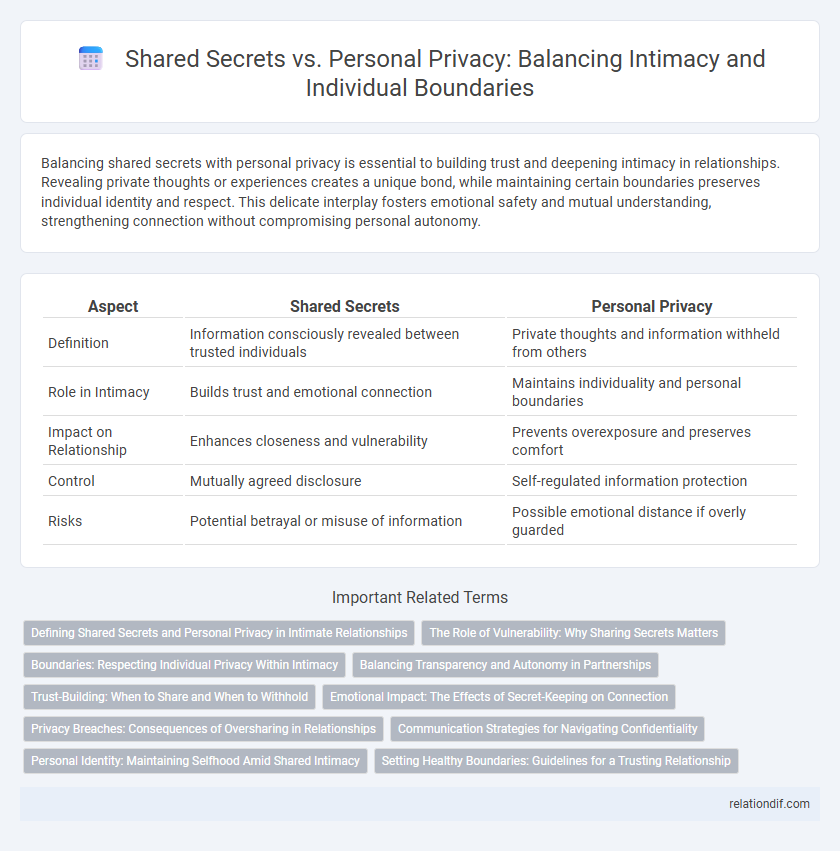Balancing shared secrets with personal privacy is essential to building trust and deepening intimacy in relationships. Revealing private thoughts or experiences creates a unique bond, while maintaining certain boundaries preserves individual identity and respect. This delicate interplay fosters emotional safety and mutual understanding, strengthening connection without compromising personal autonomy.
Table of Comparison
| Aspect | Shared Secrets | Personal Privacy |
|---|---|---|
| Definition | Information consciously revealed between trusted individuals | Private thoughts and information withheld from others |
| Role in Intimacy | Builds trust and emotional connection | Maintains individuality and personal boundaries |
| Impact on Relationship | Enhances closeness and vulnerability | Prevents overexposure and preserves comfort |
| Control | Mutually agreed disclosure | Self-regulated information protection |
| Risks | Potential betrayal or misuse of information | Possible emotional distance if overly guarded |
Defining Shared Secrets and Personal Privacy in Intimate Relationships
Shared secrets in intimate relationships involve mutually disclosed information that fosters trust and deepens emotional bonds, serving as a foundation for intimacy. Personal privacy entails maintaining individual boundaries and withholding certain aspects of one's inner life to preserve autonomy and self-identity within the relationship. Balancing shared secrets and personal privacy is essential for healthy intimacy, ensuring both connection and respect for personal space.
The Role of Vulnerability: Why Sharing Secrets Matters
Sharing secrets plays a crucial role in building intimacy by fostering vulnerability, which strengthens emotional bonds between individuals. Vulnerability in disclosing private thoughts or feelings creates trust and deepens connection, differentiating shared secrets from mere personal privacy. This openness promotes authentic communication and enhances relational closeness, essential for intimate partnerships.
Boundaries: Respecting Individual Privacy Within Intimacy
Boundaries in intimacy require a delicate balance between shared secrets and personal privacy, ensuring both partners feel safe and respected. Maintaining individual privacy fosters trust by allowing space for personal thoughts and emotions, while sharing selected secrets strengthens connection and vulnerability. Clear communication about these boundaries prevents misunderstandings and supports a healthy, respectful relationship dynamic.
Balancing Transparency and Autonomy in Partnerships
Balancing transparency and autonomy in partnerships requires open communication about shared secrets while respecting personal privacy boundaries. Establishing clear agreements on which information remains confidential fosters trust without compromising individual autonomy. Maintaining this balance enhances emotional intimacy and mutual respect within the relationship.
Trust-Building: When to Share and When to Withhold
Trust-building in intimacy hinges on discerning when to share shared secrets versus maintaining personal privacy, as shared secrets can deepen emotional bonds and foster mutual understanding. Carefully withholding certain personal information respects individual boundaries and prevents vulnerability from turning into discomfort or mistrust. Balancing transparency with discretion strengthens the foundation of trust, promoting a secure and resilient intimate relationship.
Emotional Impact: The Effects of Secret-Keeping on Connection
Shared secrets often deepen intimacy by fostering trust and a sense of belonging, yet excessive secret-keeping can create emotional barriers that hinder genuine connection. The emotional impact of withholding personal information may lead to feelings of isolation, anxiety, and diminished relational satisfaction. Balancing transparency and personal privacy is crucial for maintaining emotional closeness while respecting individual boundaries.
Privacy Breaches: Consequences of Oversharing in Relationships
Oversharing in relationships can lead to privacy breaches that damage trust and emotional security between partners. Disclosure of sensitive information without mutual consent often results in feelings of betrayal and vulnerability, undermining intimacy. Protecting personal boundaries and respecting shared secrets are essential for maintaining a healthy and trusting connection.
Communication Strategies for Navigating Confidentiality
Effective communication strategies for navigating confidentiality in intimacy involve establishing clear boundaries and mutual understanding about what information remains private versus shared. Couples benefit from setting explicit guidelines for handling shared secrets, ensuring trust is preserved while respecting personal privacy. Transparent dialogue about confidentiality fosters emotional safety and strengthens the intimate bond between partners.
Personal Identity: Maintaining Selfhood Amid Shared Intimacy
Maintaining personal identity within shared intimacy requires balancing transparency with boundaries to protect individual autonomy. Preserving private thoughts and experiences ensures a sense of selfhood amid close connections, preventing emotional enmeshment. This equilibrium fosters trust while allowing partners to retain distinct personal identities.
Setting Healthy Boundaries: Guidelines for a Trusting Relationship
Setting healthy boundaries in intimacy involves balancing shared secrets with respect for personal privacy, ensuring both partners feel safe and valued. Clear communication about which topics remain private and which are open for sharing builds trust while protecting individual autonomy. This approach fosters emotional security, preventing misunderstandings and reinforcing mutual respect in a trusting relationship.
Shared secrets vs personal privacy Infographic

 relationdif.com
relationdif.com